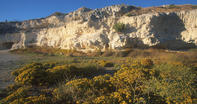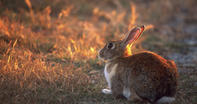Nature Interrupted
Robben Island is terribly hot in summer and freezing cold in winter. Before the arrival of humans on the island, the native vegetation consisted mainly of grasses and some low shrubs. All the trees that can be seen today were planted by humans in the last 500 years, in an effort to make the island more homely.

One of the reasons for the small amount of vegetation is that the island has never had a good water supply. There are no rivers or streams, just a few brackish pools of water. When humans arrived, water was always in short supply and houses were usually built with large barrels which would collect the rainwater. In the 20th century, a desalination plant was installed to improve the water supply, but it is still a thirsty place for those creatures which cannot live in sea-water.
There is a sense that Robben Island remains stubbornly untamed. Human beings have tried to better it by planting palm trees (now bent by the wind) and cultivating bright bougainvillea in the dusty gardens. But the island is still something of a blasted heath and that’s all part of its rugged beauty.
Wildlife Abound

The native fauna on Robben Island originally consisted mainly of aquatic animals, such as seals, sea birds and penguins. Mole snakes are also indigenous to the island. All the other animals that now live on the island were introduced by humans.
More recently, these interlopers include on average 15 Springbok, 100 Steenbok, 200 European Fallow Deer, a couple of Bontebok, an Eland and a few ostriches. There are also lots of rabbits, rats and feral cats. The island is teeming with wildlife. Rabbits skitter through the shrubs, and buck roam free across the blessedly unfenced land.
Even when you don’t see them, there is evidence of animals everywhere. Birdlife is also abound, and around 74 species of birds, including cormorants, seagulls and lapwings, thrive along the uninhabited stretch of coast. Most noticeable, however, are the African penguins. They throng along the shore, close to the harbour, and go where they please.
One long-time resident of the island who has been living there for over 20 years say that, in the old days, the penguins were less cocky because they knew that they would wind up in the pot of a hungry prison warder. Nowadays, they are taking over the island, and it is estimated that there around 13 000 of them that live there.
By David Fleminger